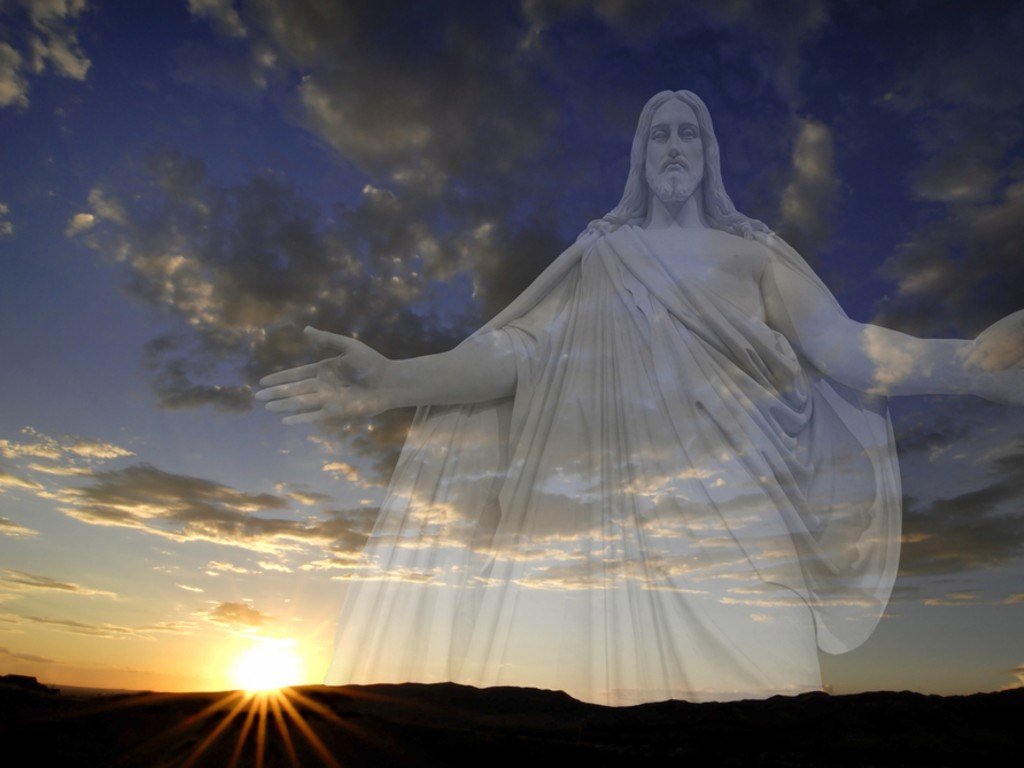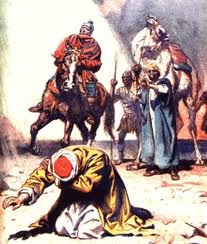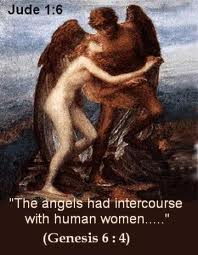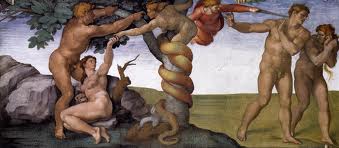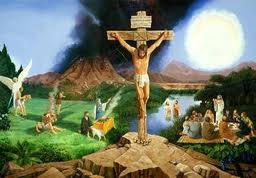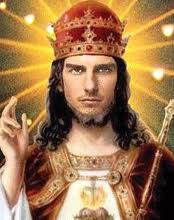|
Suspecting, quite
logically, that this "Original Sin" has something to do with
sex (although this is pretty well hidden in "J"s story of
Eve's sin, but is quite obvious in the Books of Enoch,) major
attempts have been made by the later church theologians to separate
Jesus Christ from sex in any form (sexual thoughts, sexual desires,
teen-age sexual practices, and above all from marriage and having
children of his own). Perversely, Christ has compounded this
problem in the Gospels by various provocative scenes with the Woman of
Samaria story, the Mary of Bethany story, various scenes with Mary
Magdalene, and numerous stories of intimate body contact with women who
wish to wash his feet and pour ointment on his hair.
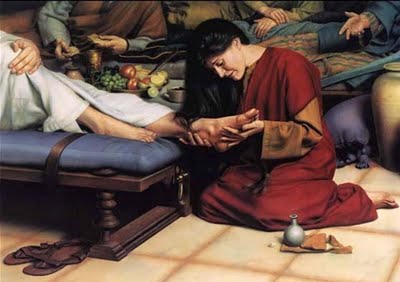
Luke was helpful in that he
writes up his "Nativity Story" with a hint that perhaps Jesus
was born without any sexual intercourse being involved between Joseph
his supposed father and Mary his real mother. Luke 1:34 "Then
said Mary unto the angel, How shall this be, seeing I know not a man? 35
And the angel answered and said unto her, The Holy Ghost shall come
upon thee, and the power of the Highest shall overshadow thee:
therefore also that holy thing which shall be born of thee shall be
called the son of God." [Unfortunately
even the fairly dumb average Catholics of the Middle Ages could still
imagine that Mary had sex with Joseph after or during the time the Holy
Ghost was "coming upon her" and the Almighty was
"overshadowing" her. And Adam and king David were
both called "a son of God.)
The problem of people really
believing that Jesus was born without sexual intercourse by Joseph and
Mary has
persisted, however, throughout the Middle Ages, and the story was
generated that Mary, Jesus' mother never had sex with anyone, even her
husband Joseph. And that all of Jesus' brothers and sisters
listed in the gospels were really his half-brothers or cousins.
(Children of Joseph by a previous marriage.) Finally it was
decided that Mary herself was the product of an IMMACULATE CONCEPTION
-- Mary herself was conceived by a union of the Holy Spirit with Mary's
mother. It was not felt to be necessary to go further back
in this divine genealogy process, which if carried too far, breaks down
logically. And we don't want that, do we?
|
The solution to the problem of imagining Jesus
living a "perfect" life, is to accept that he lived the
same life, and obeyed the same rules, as the other Essenes at the
Qumran monastery. All the seemingly radical and
supposedly impractical suggestions Jesus made for how we should
live in the Sermon on the Mount were already being observed by the
Essenes and Jesus at the time Jesus preached the Sermon on the
Mount. Indeed "the mount" was the hill or
plateau upon which the Qumran monastery was built! |

Matthew 5:1 "And
seeing the multitudes, he went up into a mountain: [the
"mountain" being Qumran] and when he was set,
his disciples came unto him: 2 And he opened his mouth, and
taught them, saying,
3 Blessed are the
poor in spirit: for
theirs is the kingdom of heaven."
"The Poor" was a well-known
contemporary nickname for the Essenes.
Wrote
Josephus in Ant. 18:1:5 (20) "It also deserves our admiration,
how much they exceed all other men that addict themselves to virtue, and
this is righteousness; and indeed to such a degree, that as it
never appeared among any other man, neither Greeks nor barbarians, no,
not for a little time, so hath it endured a long while among them.
This is demonstrated by that institution of theirs which will not suffer
anything to hinder them from having all things in common;
so that a rich man enjoys no more of his own wealth than he who
hath nothing at all." War 2:8:3 (122) "These men
are despisers of riches, and so very communicative as raises our
admiration. Nor is there any one to be found among them who hath
more than another; for it is a law among them, that those who come to
them must let what they have be common to the whole order. --
insomuch, that among them all there is no appearance of poverty or
excess of riches, but every one's possessions are intermingled with
every other's possessions: so that there is, as it were one patrimony
among all the brethren."
5 Blessed are the
meek: for they shall inherit the earth."
"The Meek" was another
Essene nickname.
6
Blessed are they which do hunger and thirst after righteousness
(because they are NOT CONFORMING TO AN EVIL WORLD): for they shall be
filled, --
See Josephus cit. #1
7 Blessed are the merciful (merciful to WHOM? to those who are the
NON-CONFORMISTS?): for they shall obtain mercy.
Jesus as an Essene had no
problem with this, and neither did Saul, after he converted to Jesus'
form of Essenism.
8 Blessed are the pure in heart (certainly a minority in today's
world!): for they shall see God.
Jesus as an Essene had no problem with this, and neither did Saul,
after he converted to Jesus' form of Essenism.
9 Blessed
are the peacemakers: for they shall be called the children of
God."
Jesus
as an Essene had no problem with this, and neither did Saul, after he
converted to Jesus' form of Essenism.
19 Whosoever
therefore shall break one of these least commandments, and shall
teach men so, he shall be called the least in the kingdom of heaven:
but whosoever shall do and teach them, the same shall be called great
in the kingdom of heaven." The
commandments here spoken of are not the familiar "Ten
Commandments" of the Old Testament Scriptures --
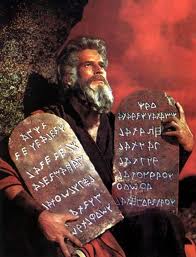
-- but the much more
rigid and difficult "commandments" of the Essene brotherhood,
which Jesus now illustrates ---
21
Ye have heard that it was said by them of old time, Thou shalt not
kill; and whosoever shall kill shall be in danger of the judgment: 22
But I say unto you, that whosoever is angry with his brother without a
cause shall be in danger of the judgment: and whosoever shall say to
his brother, Raca, shall be in danger of the council: but whosoever
shall say, Thou fool, shall be in danger of hell fire."
"The Dead Sea Scrolls in
English" G. Vermes Penguin
Books 1962 (First Edition) page 80 "Community Rule" --- "They
shall rebuke one another in truth, humility, and charity. Let no man
address his companion with anger, or ill-temper, or obduracy, or with
envy prompted by the spirit of wickednes." (This was not
just a suggestion, there were severe penalties for non-compliance -- as
Jesus has suggested above.)
"No man shall interrupt a companion before his speech has ended,
nor speak before a man of higher rank; each man shall speak in his
turn. And in the Assembly of the congregation no man shall speak
without the consent of the Congregation, nor indeed of the Guardian of
the Congregation. Should any man wish to speak to the
Congregation, yet not be in a position to question the Council of the
Community, let him rise to his feet and say 'I have something to say to
the Congregation.' If they command him to speak, he shall
speak."
"Whoever has answered his companion with obstinacy, or has
addressed him impatiently, going so far as to take no account of the
dignity of his fellow by disobeying the order of a brother inscribed
before him, he has taken the law into his own hand; therefore he shall
do penance for one year [and shall be excluded]."
"If any man has uttered the [Most] Venerable Name VII even though
frivolously, or as a result of shock or for any other reason whatever,
while reading the Book or praying, he shall be dismissed and shall
return to the Council of the Community no more."
"If he has spoken in anger against one of the Priests inscribed
in the Book, he shall do penance for one year and shall be excluded for
his soul's sake from the pure Meal of the Congregation. But
if he has spoken unwittingly, he shall do penance for six months."
"Whoever has deliberately lied shall do penance for six
months."
"Whoever has deliberately insulted his companion [as in
the example given by Jesus in Matthew 5:24] unjustly shall do
penance for one year and shall be excluded."
"Whoever has deliberately deceived his companion by word or by deed
shall do penance for six months."
"If he has failed to care for his companion, he shall do penance
for three months. But if he has failed to care for the property of
the Community, thereby causing it loss, he shall restore it in
full. And if he is unable to restore it, he shall do penance for
sixty days."
"Whoever has borne malice against his companion [another
example used by Jesus in the Sermon on the Mount] unjustly shall do
penance for six months/one year; and likewise, whoever has taken revenge
in any matter whatever."
"Whoever has spoken foolishly; three months."
"Whoever has interrupted his companion whilst speaking: ten
days."
"Whoever has lain down to sleep during an Assembly of the
Congregation: thirty days. [evidently if you could manage to
sleep sitting up, you could escape punishment]. And likewise,
whoever has left, without reason, an Assembly of the Congregation as
many as three times during one Assembly, shall do penance for ten
days. But if he has departed whilst they were standing he shall do
penance for thirty days. etc--etc.
27 Ye have heard that it was said by them of old time, Thou
shalt not commit adultery: 28 But I say unto you, That whosoever
looketh on a woman to lust after her hath committed adultery with her
already in his heart."
Writes Josephus in War 2:8:2 (120) "These
Essenes reject [sexual] pleasures as an evil, but esteem continence
[celibacy] and the conquest over our passions, to be virtue. They neglect
wedlock, but choose out other people's children, while they are pliable,
and fit for learning; and esteem them to be of their kindred, and form
them according to their own manners. (121) They do not
absolutely deny the fitness of marriage, and the succession of mankind
thereby continued; but they guard against the lascivious behavior of
women, and are persuaded that none of them preserve their fidelity to
one man."
And writes Dr.
Barbara Thiering PhD on page 44 of "Jesus and the Riddle of
the Dead Sea Scrolls" ---"For the Essenes, cilibacy was
the highest way of life. Marriage and sex were
considered to be unholy, and the aim of the higher members was to be
perfectly holy in order to be pleasing to God. We are told by the
ancient writers that the Essenes distained marriage, and in this were
strikingly different from other Jews, who valued family life."
"In the
[Dead Sea] scrolls, this attitude to cilibacy is put very
strongly. Anyone who had recently had sexual intercourse was
excluded from the temple precincts for three days. If a
couple had sex within the walls of the holy city, they 'defiled the city
of the sanctuary with their uncleanness'. The highest order of the
Essenes lived a type of life that can be called monastic, in that
they were a community of men living away from the world within the stone
walls of the Qumran buildings, having all property in common and owning
nothing, dedicated to religion, and renouncing marriage."
"But
some of them recognized that if they did not marry and have children,
the race would not continue. For the holiest order, this was
not a problem. It is very likely that their members were drawn
from the ranks of abandoned or illegitimate children
whom the Essenes took in. The ancient equivalent of abortion
was to expose an unwanted child in a deserted place, and the Old
Testament shows that some priests had the custom of taking in the
children, both males and females, and bringing them up in the sanctuary
as acolytes or prophetesses. As they had no family to
perpetuate, celibacy was required, and came to be associated with
holiness."
"For some very important people in the Essene ranks, however, it
was essential to continue their family line. They were members of
the great dynasties, the Zadocs and the Davids, who had been the high
priests and kings of Israel before the fall of the temple in the sixth
century BC. One reason why the movement had come into
existence was to preserve these leaders and all that they stood
for."
The
real history of Jesus, which is revealed by the "Gospel Pesher"
Dr. Barbara Thiering explains in her book, shows that at various times
in his life Jesus belonged to both groups, the "celibate" and
the "non-celibate" group that must preserve their family
dynasty by marrying and having children. The "Pesher"
shows Jesus had three children with Mary Magdalene, none of which were
born before his crucifixion. Paul was very much aware of Jesus'
lack of "perfect holiness" in this regard, because Paul
married Jesus' daughter Demaris when she was about 20 years old.
(September AD 53 in Cenchreae, Greece)
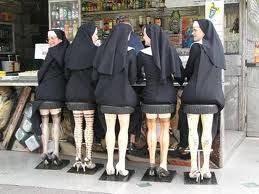
Matthew 5:27 and 28 are not advice for you and I, or even for Catholic
priests and nuns, but were advice Jesus was giving to all those orphans
in the Qumran monastery that had no choice but to live out their natural
lives "without women and without love." Jesus
could give this advice in good faith, and they all knew that, because
while some of the high priests were in power, they considered Jesus
himself to be illegitimate. One of those who did consider
Jesus to be a legitimate descendent of King David was Jonathan Annas,
the Essene high priest at Qumran in 29 AD. He allowed the
betrothal of Jesus and Mary Magdalene. It was over three
years later in the fall of 33 AD that Mary gave birth to Demaris, who
later became the wife of the Apostle Paul.
29 And if thy right eye offend thee, pluck it out, and cast it
from thee; for it is profitable for thee that one of thy members should
perish, and not that thy whole body should be cast into hell."
30 And if thy right hand offend thee, cut it off, and cast it
from thee: for it is profitable for thee that one of thy members should
perish, and not that the whole body should be cast into hell."
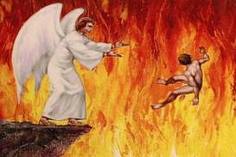
Here
Jesus is not so much giving the Catholics and the Baptists a means to
acquire and keep members in their churches as he is again revealing that
he was an Essene. The Jews of the Old Testament scriptures
believed in neither heaven nor hell. Solomon wrote: "For
the living know that they shall die: but the dead know not
anything, neither have they any more a reward; for the memory of them is
forgotten. Also their love, and their hatred, and their
envy, is now perished; neither have they any more a portion for ever in
any thing that is done under the sun." Ecclesiastes 9:5,6.
The
Essenes, however, had a different view of the hereafter, one here being
shared by Jesus in Matthew 5:29,30 (and elsewhere).
Wrote
Josephus in Ant 18:1:5 (18)"The doctrine of the Essenes is
this: That all things are best ascribed to God. They teach the immortality
of souls, and esteem that the rewards of righteousness are to
be earnestly striven for---"
And in War
2:8:11 (154) "For their doctrine is this: -- That bodies are
corruptible, and that the matter they are made of is not permanent; but
that the souls are immortal, and continue forever; and that they
come out of the most subtile air, and are united to their bodies as in
prisons, into which they are drawn by a certain natural enticement; (155)
but that when they are set free from the bonds of the flesh, they
then, as released from a long bondage, rejoice and mount
upward."

"And this
is like the opinion of the Greeks, that good souls have their
habitations beyond the ocean, in a region that is neither oppressed with
storms or rain, or snow, or with intense heat, but that this place is
such as is refreshed by the gentle breathing of a west wind, that is
perpetually blowing from the ocean; while they allot to bad souls a dark
and tempestuous den, full of never-ceasing punishments."
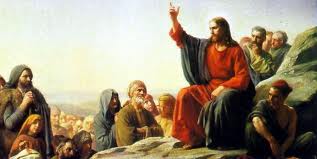
39
"But I say unto
you, That ye resist not evil: but whosoever shall smite thee on thy
right cheek, turn to him the other also. 40 And if any man
will sue thee at the law, and take away thy coat, let him have thy
cloak also."
41
"And whosoever
shall compel thee to go a mile, go with him twain. 42 Give to
him that asketh thee, and from him that would borrow of thee turn not
thou away."
Wrote
Josephus in War 2:8:4 (124) "They have no certain city but
many of them dwell in every city; and if any of their sect come from
other places, what they have lies open for them, just as if it were
their own; and they go into such as they never knew before, as if they
had been ever so long acquainted with them. (125) For
which reason they carry nothing with them when they travel into remote
parts, though still they take their weapons with them, for fear of
thieves. Accordingly there is in every city where they live
one appointed particularly to care for strangers, and to provide
garments and other necessities for them."
Jesus
had an Essene father and an Essene mother, and Yes, he would give you
the coat off his back -- knowing it would be replaced by the other
Essenes by the end of the day. Everywhere he went in the
Gospels he was among Essenes, who would see to it he had food to eat,
clothes to wear, and a place to sleep.
42
"Ye have heard
that it hath been said, Thou shalt love thy neighbor, and hate thine
enemy. 42 But I say unto you, Love your enemy,
bless them that curse you, do good to them that hate you, and pray for
them which despitefully use you, and persecute you."
I
have already listed for you above some of the penalties written into the
"Community Rule" of the Essenes for NOT treating others in the
manner that Jesus has described here! Even
more important to the Essenes than the immediate penance they must pay,
was the knowledge that they might forfeit their chance to go to the
region of the blessed by acting badly, even towards their enemy.
48 Be ye therefore
perfect, even as your Father which is in heaven is
perfect."
During
the 3 1/2 years that Jesus was the "Messiah" at Qumran, 29 to 33
AD, the "Father" (Essene Priest) was Jonathan Annas, and
"Heaven" was the Qumran monastery --- so --- "Your Father
which is in heaven" was Jonathan Annas living in the Qumran
monastery. (Which makes being "perfect" a goal that
is attainable, however not very convenient for most of us.)
Repeating now our Question---
How did JESUS
ESCAPE Adam's
ORiginal SIN?
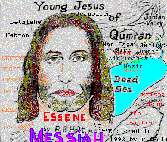
He lived at QUMRAN
where
NO-ONE (including Paul)
his son-in-law, believed in
ORiginal SIN!
NEXT:
CONFORMITY now required!
|

